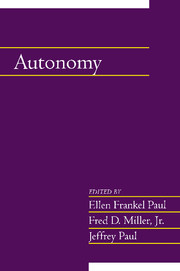Book contents
- Frontmatter
- Contents
- Introduction
- Acknowledgments
- Contributors
- Stoic Autonomy
- Autonomous Autonomy: Spinoza on Autonomy, Perfectionism, and Politics
- Kant on the Theory and Practice of Autonomy
- How Much Should We Value Autonomy?
- Autonomy, Duress, and Coercion
- Autonomy and Hierarchy
- Reason and Autonomy
- Identification, the Self, and Autonomy
- Some Tensions between Autonomy and Self-Governance
- Autonomy from the Viewpoint of Teleological Behaviorism
- The Paradox of Group Autonomy
- Abortion, Autonomy, and Control over One's Body
- Freedom as a Political Ideal
- Index
Identification, the Self, and Autonomy
Published online by Cambridge University Press: 06 July 2010
- Frontmatter
- Contents
- Introduction
- Acknowledgments
- Contributors
- Stoic Autonomy
- Autonomous Autonomy: Spinoza on Autonomy, Perfectionism, and Politics
- Kant on the Theory and Practice of Autonomy
- How Much Should We Value Autonomy?
- Autonomy, Duress, and Coercion
- Autonomy and Hierarchy
- Reason and Autonomy
- Identification, the Self, and Autonomy
- Some Tensions between Autonomy and Self-Governance
- Autonomy from the Viewpoint of Teleological Behaviorism
- The Paradox of Group Autonomy
- Abortion, Autonomy, and Control over One's Body
- Freedom as a Political Ideal
- Index
Summary
INTRODUCTION
Autonomy, we suppose, is self-regulation or self-direction. There is a distinct idea that is easily confused with self-direction, namely, selfexpression, self-fulfillment, or self-realization. (I do not mean to suggest that the latter three terms are all synonymous. But in this essay, whatever differences there are among them play no role, so I will use them interchangeably.) Although it will turn out paradoxically that autonomy is neither self-regulation nor self-realization, it is reasonable to suppose that the former is a superior candidate. My teacher of Indian religion, Dr. Subodh Roy, blind from birth, chose not to undergo an operation that would have made him sighted because he believed, perhaps rightly, that the ability to see would interfere with his religious quest. He thereby chose not to realize one of his fundamental human capacities, one whose cultivation has produced some of the finest fruits of civilization. Joseph Raz describes a case in which a man places his life in jeopardy by undertaking a trip to deliver medical aid to a group of people in a distant place. Since he will be unable to secure food for several days, he, in effect, subordinates one of his own basic needs or interests to a goal that he deems more important. There is no reason to believe that, in refusing to express or realize a dimension of self, either Dr. Roy or Raz's philanthropist have failed to act autonomously.
Information
- Type
- Chapter
- Information
- Autonomy , pp. 199 - 220Publisher: Cambridge University PressPrint publication year: 2003
Accessibility standard: Unknown
Why this information is here
This section outlines the accessibility features of this content - including support for screen readers, full keyboard navigation and high-contrast display options. This may not be relevant for you.Accessibility Information
- 1
- Cited by
